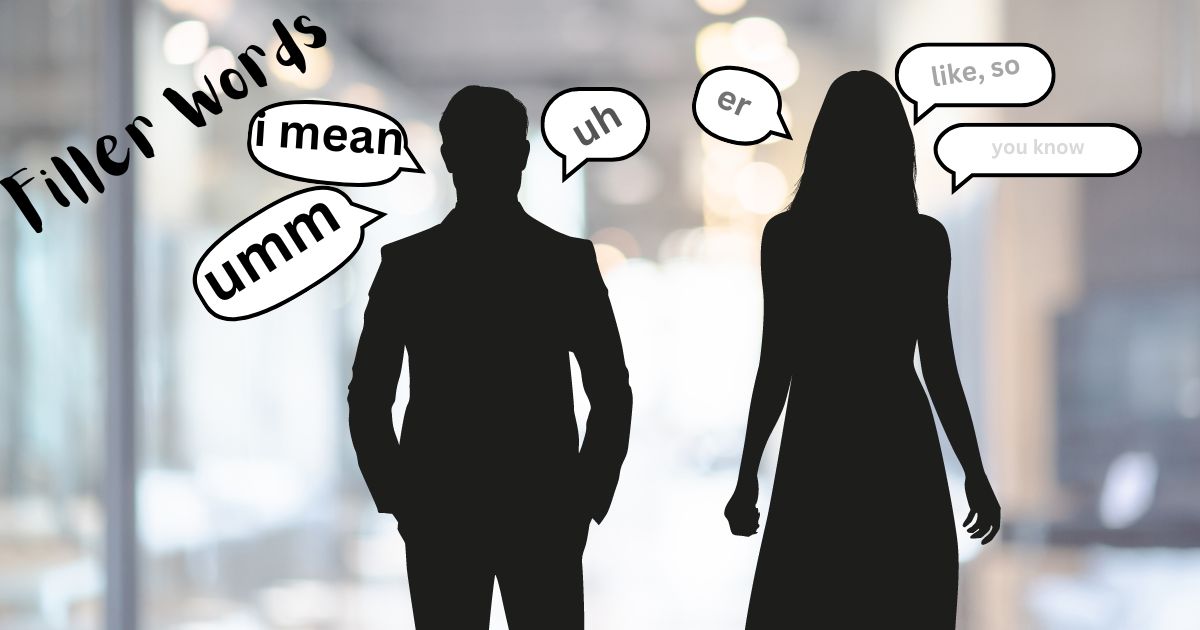What are Filler Words and What Causes Filler Words?

Do you make the right verbal first impression when you speak? Whether you speak to one person or speak to an audience, the amount of filler words can pollute what you say.
What if I said the following?
Uh like today I suppose I’m going to umm, tell you how you can actually become aware of filler words. Okay. Speaking in ah filler words can sort of distract from what you say. Do you know what I mean? Literally less fillers is very um…. What I would like to say is you want to err, well, like actually, make the right verbal, something along the lines, impressions.
The above exaggerated example contains an abundance of fillers. When you cut out all the fillers you reveal the core meaning.
I’m going to tell you how you can become aware of filler words. Speaking in filler words can distract from what you say. Less fillers allows you to make the right verbal first impressions.
What are filler words?
Filler words are unnecessary verbalized sounds and words that fill your speaking space. Think of filler words as verbal packing peanuts. These words and sounds act as extra fluffy filler around your words. Fillers like packing peanuts take up necessary verbal space and can cause clutter with the words you do say. Three kinds of filler include sounds, words, and phrases.
· Filler sound examples include ah, um, err, and oh.
· Filler word examples include so, like, actually, okay, right, literally, very, and just.
· Filler phrase examples include’ I suppose’,’ sort of’, ‘you know what I mean’, and ‘something like that’.
For the rest of this article the word fillers mean filler words, filler sounds, and filler phrases. Fillers lack value, lack meaning, and they can distract from the importance of what you say. You can cut fillers from your language and retain the core meaning of what you say.
Problem with Filler words
Fillers can make you sound inarticulate, uncertain, or long-winded. Fillers distract an audience from what you're saying and can dilute and distort the message of what you're saying. As I previously said, fillers act as verbal packing peanuts to cause clutter around the important words you want to say.
Worse fillers make you sound unprepared, and ignorant. In the world of two second attention spans, and competing for attention with electronic devices, you have to make every word matter for people to keep listening to you.
First Impressions
When you reduce fillers and eliminate them you're going to convey credibility and exude your confidence. When you use less fillers you will sound more articulate, prepared, and intelligent. People listening to you will perceive you as a much better communicator.
Where do Fillers Come From?
I want you to make fantastic first impressions every time you open your mouth. Before you can begin working on reducing and eliminating your fillers you need to bring fillers to your conscious awareness. Thanks to filler scientists capturing fillers with fly paper and placing the fillers under a Vh-S3 words-a-scope (a microscope that can see the molecular structure of fillers) we now know of 8 places fillers come from.
1) Nervousness
When you're nervous, your mind isn't focused on what you're trying to say. Instead you’re focused on your anxiety, your fears, and trying to survive while you're talking to people. When you lose control of your nerves, you also lose control of your exact word choices.
2) Unpreparedness
Processing your words for the first time is like driving somewhere new without guidance for the first time. If you don’t know where you are driving you’ll likely make some wrong turns. If you don’t know what you are saying for the first time you’ll likely make some verbal wrong turns with fillers.
3) Too scripted
When you try to get everything scripted in advance you can get lost when you go off script. When you’re trying to find your back to a script, the fillers can fly out.
4) Shocked/ Startled
Unexpected comments and questions, an answer you didn’t expect, and distractions in a room can shock and startle you. When you get mentally flustered, you lose track of your regular words. During your mental misfire you can sputter out fillers.
5) Mental Interruptions
Sometimes while you're speaking you will think of a new thought which changes what you want to say. You interrupt yourself as you make a sudden transition to a new idea. While you download the thought from your mind and upload the words out of your mouth the brief interruption can cause fillers.
6) Verbal interruptions
When someone interrupts your train of thought, you can mentally derail from your regular words into the ditch of fillers.
7) Thinking aloud
Some people verbalize their thoughts as they formulate a reply. When thinking for words, a response frequently allows filler sounds. When you do speak you can emit a few fillers.
8) Buying Time to Finish Your Thoughts
Some people use fillers as they buy time and stall time in their responses. Instead of getting into the answer, the person spews a stream of fillers out the mouth.
Make the Right Verbal First Impressions
You now know what fillers are and where fillers come from. When you become mindful of fillers from the 8 places to check you can begin to reduce them. Think about where can reduce fillers so can convey credibility and exude your confidence the next time you speak.
Read 3 ways to bring filler words to your awareness
